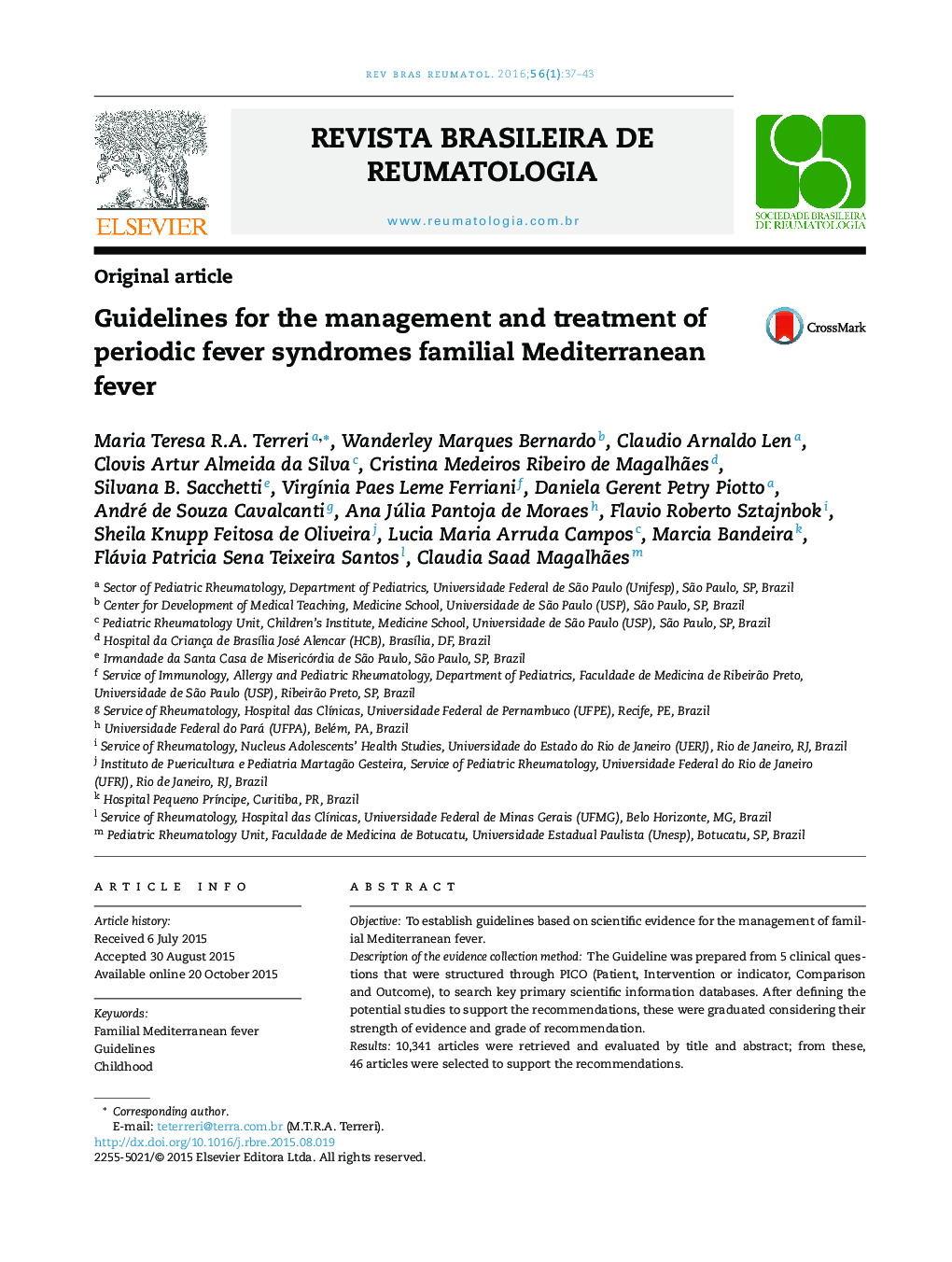| کد مقاله | کد نشریه | سال انتشار | مقاله انگلیسی | نسخه تمام متن |
|---|---|---|---|---|
| 3385043 | 1220569 | 2016 | 7 صفحه PDF | دانلود رایگان |
ObjectiveTo establish guidelines based on scientific evidence for the management of familial Mediterranean fever.Description of the evidence collection methodThe Guideline was prepared from 5 clinical questions that were structured through PICO (Patient, Intervention or indicator, Comparison and Outcome), to search key primary scientific information databases. After defining the potential studies to support the recommendations, these were graduated considering their strength of evidence and grade of recommendation.Results10,341 articles were retrieved and evaluated by title and abstract; from these, 46 articles were selected to support the recommendations.Recommendations1. The diagnosis of FMF is based on clinical manifestations, characterized by recurrent febrile episodes associated with abdominal pain, chest or arthritis of large joints. 2. FMF is a genetic disease presenting an autosomal recessive trait, caused by mutation in the MEFV gene. 3. Laboratory tests are not specific, demonstrating high serum levels of inflammatory proteins in the acute phase of the disease, but also often showing high levels even between attacks. SAA serum levels may be especially useful in monitoring the effectiveness of treatment. 4. The therapy of choice is colchicine; this drug has proven its effectiveness in preventing acute inflammatory episodes and progression toward amyloidosis in adults. 5. Based on the available information, the use of biological drugs appears to be an alternative for patients with FMF who do not respond or are intolerant to therapy with colchicine.
ResumoObjetivoEstabelecer diretrizes baseadas em evidências científicas para manejo da Febre Familiar do Mediterrâneo (FFM).Descrição do método de coleta de evidênciaA Diretriz foi elaborada a partir de 5 questões clínicas que foram estruturadas por meio do P.I.C.O. (Paciente, Intervenção ou Indicador, Comparação e Outcome), com busca nas principais bases primárias de informação científica. Após definir os estudos potenciais para sustento das recomendações, estes foram graduados pela força da evidência e grau de recomendação.ResultadosForam recuperados, e avaliados pelo título e resumo, 10.341 trabalhos, tendo sido selecionados 46 artigos para sustentar as recomendações.Recomendações1. O diagnóstico da FFM é baseado nas manifestações clínicas, caracterizadas por episódios febris recorrentes associados a dor abdominal, torácica ou artrite de grandes articulações; 2. A FFM é uma doença genética apresentando traço autossômico recessivo ocasionada por mutação no gene MEFV; 3. Exames laboratoriais são inespecíficos demonstrando níveis séricos elevados de proteínas inflamatórias na fase aguda da doença, mas também, com frequência, demonstrando níveis elevados mesmo entre os ataques. Níveis séricos de SAA podem ser especialmente úteis no monitoramento da eficácia do tratamento; 4. A colchicina é a terapia de escolha tendo demonstrado eficácia na prevenção dos episódios inflamatórios agudos e progressão para amiloidose em adultos; 5. Com base na informação disponível, a utilização de medicamentos biológicos parece ser alternativa para pacientes com FFM que não respondem ou que são intolerantes à terapia com colchicina.
Journal: Revista Brasileira de Reumatologia (English Edition) - Volume 56, Issue 1, January–February 2016, Pages 37–43
